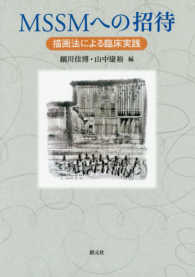- ホーム
- > 洋書
- > 英文書
- > Politics / International Relations
Full Description
We are in an era marked by rapid geopolitical shifts and evolving security challenges, the need for a comprehensive understanding of intelligence failures and strategic surprises has never been more critical. In this important work, Frederic Lemieux analyzes intelligence failures and strategic surprises in geopolitical contexts, offering historical and contemporary case studies, exploring causes and consequences, and providing insights into improving intelligence practices and understanding future geopolitical challenges.
Bridging the gap between academic theory and practical intelligence analysis in the context of modern geopolitical instability, Lemieux features in-depth case studies spanning over eight decades, from the attack on Pearl Harbor in 1941 to the recent Hamas Attack in 2023. Recounting not only the events but also dissecting the types and sources of intelligence failures and their broader geopolitical implications, this historical breadth provides readers with a diverse range of scenarios to understand the evolution and recurring patterns of intelligence oversights. By exploring how technological advancements such as artificial intelligence can mitigate human cognitive biases, Lemieux presents a forward-looking perspective on intelligence practices. Operating under the premise that understanding past failures is crucial for improving future intelligence operations, this study demonstrates how we can re-shape international relations and emphasizes the importance of adapting intelligence analysis to the changing nature of global threats.
A timely work which integrates insights from political science, psychology, history, and technology, this text provides intelligence professionals, policymakers, scholars, and students with a nuanced understanding of the complex interplay between intelligence, decision-making, and geopolitical dynamics.
Contents
Chapter 1. Intelligence and Intelligence Failures
Chapter 2. Sources of Intelligence Failures
Chapter 3. Strategic Surprises
Chapter 4. Foundations of Geopolitical Instability
Chapter 5. Pearl Harbor Attack (1941)
Chapter 6. Cuban Missile Crisis (1962)
Chapter 7. Munich Olympic Games (1972)
Chapter 8. Yom Kippur (1973)
Chapter 9. India Nuclear Test (1974)
Chapter 10. 9/11 Attacks (2001)
Chapter 11. Iraq WMD (2003)
Chapter 12. Arab Spring (2011)
Chapter 13. US withdrawal from Afghanistan (2021)
Chapter 14. Ukraine Invasion (2022)
Chapter 15. Hamas Attack on Israel (2023)
Chapter 16. Structured Analytical Techniques
Conclusion: Learning from the Past, Preparing for the Future







